Commemorating Col. Lajos Gidófalvy
Szöveg: Ádám Draveczki-Ury | 2011. január 17. 15:02The Gidófalvy Memorial Committee held a wreath laying ceremony with military honours on Saturday, January 8, 2011. On the 110th anniversary of Col. vitéz Lajos Gidófalvy’s birth, wreaths were laid at the memorial tablet of the commander of the former XIII/1st KISKA (army support) Battalion.
“Lajos Gidófalvy was born on an illustrious day, on the first day of the 20th century, January 1, 1901, in the village of Bögöz, in Transylvania, the womb of our homeland at that time, giving true Hungarians," said LTC (Ret.) József Bősze, the chairman of the Gidófalvy Memorial Committee in his speech, who went on to relate the events of Lajos Gidófalvy’s life
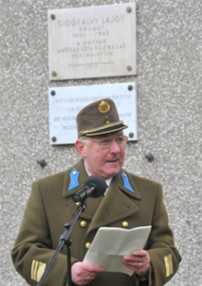
The world war hero was always attracted by the military career path. As soon as he had the opportunity, he joined the Royal Hungarian Army, were he was serving as a volunteer between 1927 and 1932. After he was discharged, he got married, then in 1938 he was ordered to enroll on a reservist officer training course and was promoted to warrant officer. He participated in the occupation of the Felvidék and Transylvania, and received commemorative medals for his role. In the meantime, he became a career officer. By the time he was appointed the commander responsible for the training of the ‘levente’ (military-oriented youth) in Angyalföld, Budapest, he held the rank of lieutenant. On September 26, 1944, when the Hungarian government established the National Guard, Gidófalvy set up the National Guard Company from the youth of Angyalföld, which was later organized into the Support Battalion of the Hungarian armed forces. “Everyone who wanted to do something for the homeland, for humanity could find their way to this unit," underlined Lajos Bősze. “Lt. Gidófalvy organized armed groups that protected our national assets, prevented the closing of certain factories in Angyalföld, the soldiers under him preserved for the future the Ferdinand bridge, the Rákosrendező railway station and the railway flyover on what we call Dózsa György Street today. Lajos Gidófalvy and his soldiers provided people in need with IDs, which meant life in those years, and distributed food among people living in protected houses and houses marked with a star," said the chairman of the Memorial Committee, pointing out that by the end of 1944, Gidófalvy’s men were distributing food among 1,2001,300 people from the supplies of Archduke William Barracks, in the place of which today we can find a housing estate bearing the name of Lajos Gidófalvy. “He was in contact with the representatives of Hungarian and international humanitarian organizations, and also with Raoul Wallenberg, who later became the victim of Stalinism," Lajos Bősze reminded those present at the commemoration.
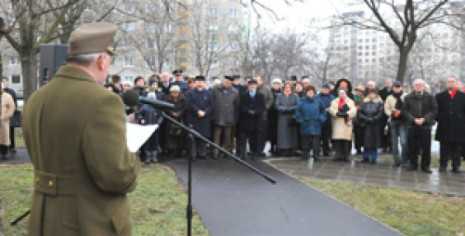
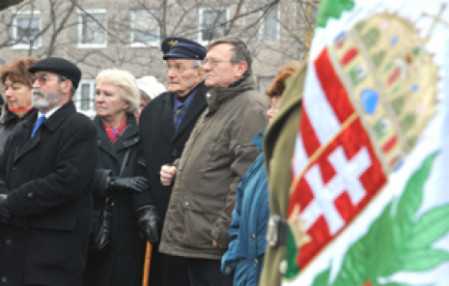
“Thanks to Memorial Committee’s efforts, the memory of Lajos Gidófalvy has survived every change of regime; so today a street and a housing estate in Budapest bear the honorable name, and in two places there are memorial tablets paying tribute to the activities of the heroic commander and the battalion led by him," said Lajos Bősze. A Holocaust survivor, Lídia Fridrich, who lives in Canada and whose family was rescued by Lajos Gidófalvy and his soldiers, supported the Memorial Committee in its efforts that finally led to the recognition of Col. Lajos Gidófalvy, who in 1997 was awarded the honoring title ’Righteous Among The Nations’ by the Yad Vashem Institute for his humanitarian activities during World War II. “By admitting him into the order in 1997, the Vitéz Order, reorganized on the principles of democratic law, has elevated him as one of our military heroes, renowned for his patriotism and officer’s honor," said the chairman. “For his outstanding performance and courageous acts performed during his military service, the Minister for Home Affairs of the Republic of Hungary awarded him the Service Sign for Bravery in 1998."
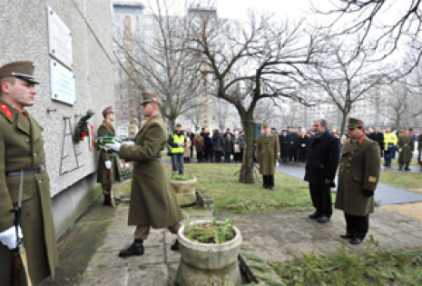
“Every year, grateful successors in many memorial places and cemeteries around the world remember the known or unknown heroes of the military who were fighting under arms for the survival of our 1,100-year-old statehood. One of them was Colonel Lajos Gidófalvy who, through his feats, earned further recognition for the famous valor and heroism of Hungarian soldiers, and today his name and achievements are recognized in many countries around the world. His personality and memory exemplify all those real human values which are disappearing human qualities in this changing, rushing world," said Lajos Bősze.
Following the speech of the chairman, wreaths were laid at the memorial tablet. The ceremony ended with the Szózat (second national anthem) and the Last Post.
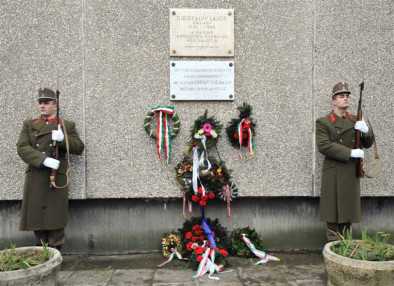
Photo: László Tóth